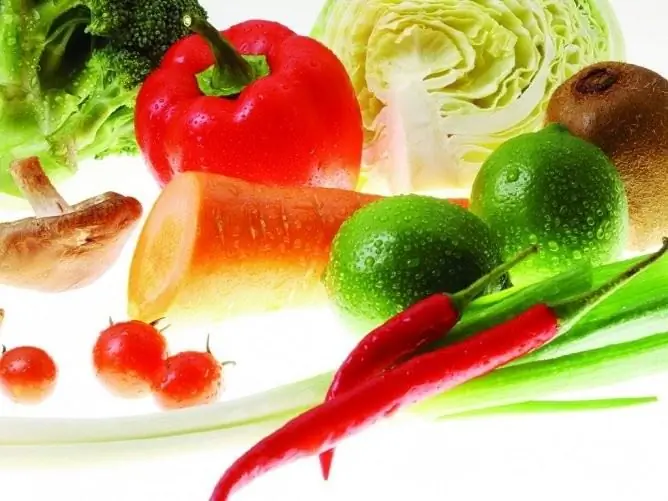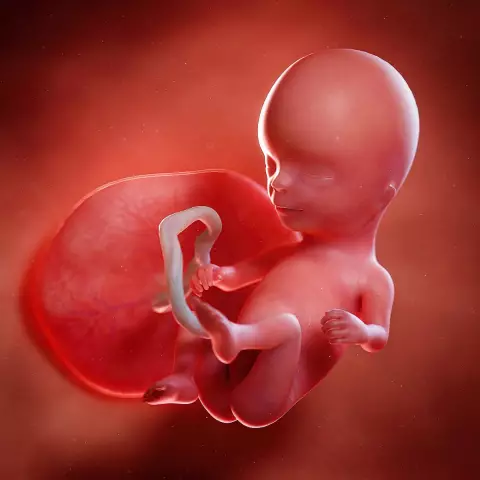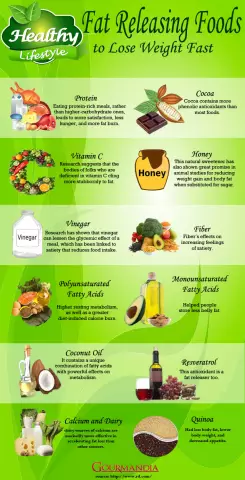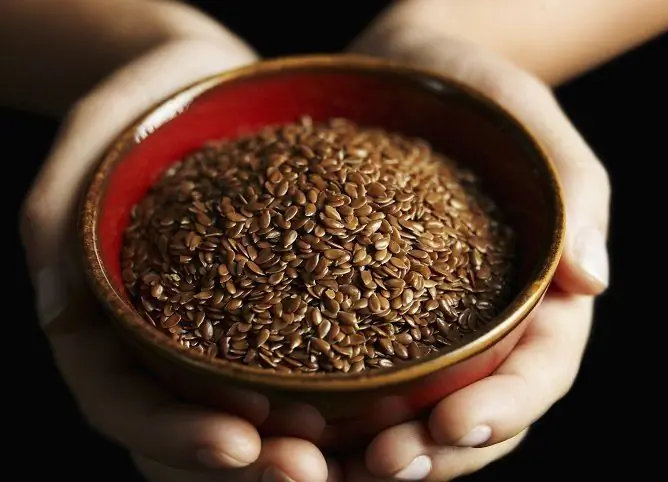- Author Rachel Wainwright wainwright@abchealthonline.com.
- Public 2024-01-15 19:51.
- Last modified 2025-11-02 20:14.
Diet for constipation
The content of the article:
- Diet recommendations
- Menu for the week
- Overview of Constipation
- Video
Constipation is a chronic persistent disorder of the large intestine. Diet for constipation is the main treatment option, it allows you to get a lasting positive effect in 80% of cases (with the exception of constipation caused by anatomical disorders).

In addition to a certain set of products, medical nutrition includes recommendations for the frequency and compliance with the water regime.
Diet recommendations
Diet for constipation in women, like in men, requires certain rules presented in the table.
| Recommendation | Explanation |
| Fractional nutrition | Food should be taken 5-6 times a day in small portions. This allows you to avoid intense stress on the intestines and stabilize its work in a single rhythm. |
| Compliance with meal times | The main meal should be at noon. But for various reasons, this is not always possible, therefore it is permissible to slightly shift the meal at lunchtime, but not to allow overeating in the evening. |
| Compliance with the water regime | Adequate water intake - drink 1 to 2 liters daily, but it is important to take into account concomitant pathology (arterial hypertension, diabetes mellitus, renal failure). |
|
The predominance of certain foods |
The predominance of plant foods in the diet (up to 60-80%). This is due to the presence of organic acids and sugars, which stimulate intestinal motility. In addition, such food is a source of dietary fiber, which has a laxative effect and increases the volume of feces (provides pressure on the intestinal walls and mechanoreceptors), thereby stimulating the evacuation of the contents. |
| Complementary food |
Eating fermented milk products (kefir, cream, fresh sour cream) every day - they can slightly stimulate the intestines. Bran, flaxseed, seaweed, plantain seeds are used as biological food additives, have a mild and safe effect (loosening the stool). They are best taken in the morning and at night with plenty of fluids. It is also recommended to increase your daily water intake by 1-2 glasses, as fiber tends to swell in the intestines. |
| Calorie content |
Calorie content should not exceed the daily norm (about 2000-2500 for women and 3000-3500 for men). It may vary slightly depending on a number of factors. |
| Foods requiring exclusion from the diet |
Prohibit or recommend reducing the consumption of the following foods: · Bread from flour of the highest grades (it is permissible to use grades of coarse grinding); · Butter dough and products made from it (buns, pastries); · Fatty meats, smoked meats; · Semi-finished products and fast food; · spicy dishes; · Coffee, strong tea and chocolate; · rice porrige; · Potatoes. Do not eat foods that lead to significant gas production (beans, sorrel, spinach, apple juice). |
Dietary recommendations vary according to the type of constipation.
| Constipation type | Power features |
| Spastic | Slag-free diet with few fat and vegetables (fresh or steamed). It is required to exclude vegetables containing essential oils (turnip, radish, onion) from the diet. |
| Hypokinetic | Vegetable fats (sunflower or olive oil) are added to food. They are recommended for use for any type of constipation as a prophylaxis for anal fissures. |
| With adhesive intestinal obstruction | They require adequate use of funds that increase the volume of feces (depending on the individual picture, their use may be completely prohibited). This is due to an increase in intestinal loops and the occurrence of even greater compression of it by adhesions. |
| In late pregnancy |
Nutrition for constipation in women during this period has the following features: 1. Calorie content should correspond to the duration of pregnancy (increase by 300 kcal every 2-3 weeks). 2. The diet must be completely balanced (in addition to plant foods, protein is added, that is, meat products). 3. It is necessary to eat in small portions at regular intervals. 4. A significant increase in water intake is not recommended due to the increased burden on the kidneys (requires discussion with your doctor) |
Menu for the week
For chronic intestinal diseases, accompanied by constipation with a mild and fading exacerbation or without exacerbation, treatment table No. 3 according to Pevzner is recommended.
Purpose: normalization of bowel function.
Approximate content of the diet:
- proteins - 80-110 g (55% of animal origin);
- fats - 80-110 g;
- carbohydrates - 400-420 g;
- calorie content - 2600-2800 kcal;
- free liquid - 1-1.5 liters.
One of the possible options for the correct menu for the week is presented in the table.
| Eating | Food is acceptable |
| Breakfast |
Oatmeal with prunes or dried apricots (200-300 g). Tea or dried fruit compote. Use honey instead of sugar. Muesli, breakfast cereals or cereals with yogurt or milk (200-300 g). Juice (grape, multifruit with pulp). Buckwheat, millet or barley porridge. It is permissible to cook either simply in water or in milk (200-300 g). A glass of low fat milk. |
| Lunch |
Not a complete meal, light snack: Yogurt along with some kind of fruit (apple, persimmon, banana). Bread with jam or honey. A glass of weak tea. Light fruit or vegetable salad (150 g) with dressing (yogurt, sour cream, butter). Dried fruits (prunes, dried apricots, apricots, figs) in small quantities of about 100-150 g. |
| Dinner |
Light vegetable soup with chicken. Fried fish with a garnish (mashed potatoes, buckwheat) about 300 g. Salad of cucumbers and tomatoes or cabbage and carrots, seasoned with oil. For dessert, fruit, marmalade, marshmallow. Borscht (lean). Vegetables with lean meat (rabbit, chicken). For dessert, fruit salad with yoghurt dressing or vegetables. Vegetable soup. Steamed meat with vegetables or porridge and Greek salad. For dessert tea with honey and marshmallow. |
| Afternoon snack |
Not a complete meal, light snack: Fruit or vegetable salad (150 g) with any dressing. Weak tea with red fish sandwiches and wholemeal bread. Possibly a cheese or avocado addition. Dried fruits (prunes, dried apricots, apricots, figs) in small quantities of about 100-150 g. Fermented baked milk, yoghurt, curds. |
| Dinner |
Boiled or cooked chicken breast, vegetable salad (vinaigrette, for example). Stewed vegetables with lean fish and dried fruit compote. Cottage cheese casserole and herbal tea or juice. |
An approximate list of dishes is given without taking into account the individual characteristics of a person (to choose the right diet after clarifying the diagnosis).

Vegetables provide the intestines with much needed dietary fiber for normal function.
Overview of Constipation
The diagnosis is made in case of a decrease in the frequency of bowel movements (less than 3 times a week), accompanied by forced straining during bowel movements. Some features of the disease:
- Persons of any age are affected. The difference lies only in the cause of the occurrence - in a child, congenital anomalies of the intestine are more often the basis of the disease, and in an adult - alimentary errors or diseases like adhesive intestinal obstruction. The problem of constipation is relevant in older people (up to 90%).
- Depending on the type of the disease, it may appear for a short time (from a week to a month) or become chronic.
- Poorly treatable (especially chronic idiopathic forms). Requires a long selection of drugs and taking them for several months with periodic breaks.
- The type of constipation is determined after careful diagnosis. Treatment also depends on it.
- Impairment of normal motor skills is a symptom of a number of diseases (obstruction, Hirschsprung's disease, spinal injury), and can also act as a separate nosological form.
Video
We offer for viewing a video on the topic of the article.

Anna Kozlova Medical journalist About the author
Education: Rostov State Medical University, specialty "General Medicine".
Found a mistake in the text? Select it and press Ctrl + Enter.






